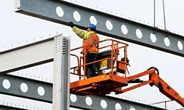Canada

February 27, 2020
No Duties on Fabricated Structural Steel from Canada, China and Mexico
Written by Sandy Williams
The U.S. International Trade Commission rejected antidumping and countervailing duties for fabricated structural steel from Canada, China and Mexico.
The USITC found that the U.S. industry is not materially injured or threatened by imports of the products from the three countries after a Commerce investigation determined that China and Mexico were subsidizing the products and selling them in the U.S. at less than fair value.
The 3-2 decision by the ITC means that no antidumping or countervailing duties will be imposed on fabricated structural steel imports from Canada, China and Mexico.
The petitioner in this case was the American Institute of Steel Construction Full Member Subgroup, Chicago, Ill.
“We are clearly disappointed with the ITC’s negative determination. U.S. fabricators and the American families who depend on them are hurting because of unfairly traded FSS imports and will suffer additional harm in the absence of much-needed trade relief,” said Charles J. Carter, president of the AISC. “Our members’ facilities are sitting underutilized as these imports undercut us on price and take projects across the United States. American fabricators are the best in the world and can compete against anyone anywhere, but they shouldn’t be forced to compete against dumped and subsidized FSS.”
See CRU’s analysis, “CRU: Negative Ruling in U.S. Fabricated Steel Case to Weigh on Market,” elsewhere in this issue.






